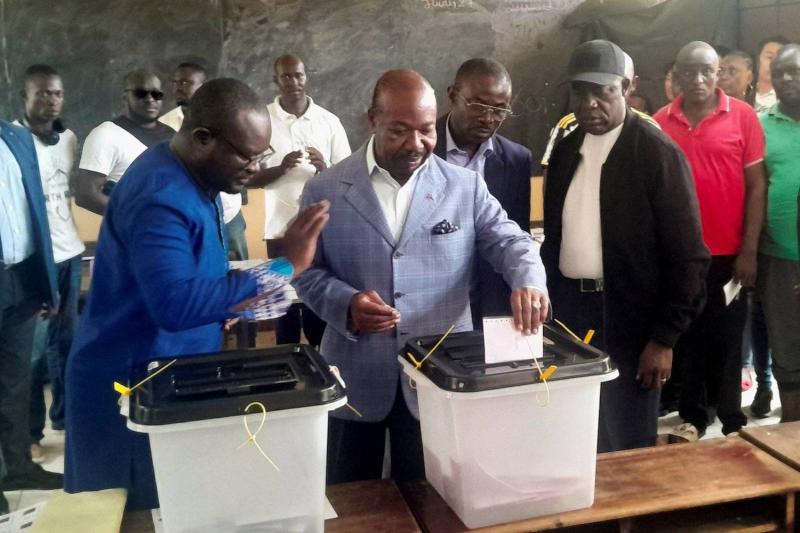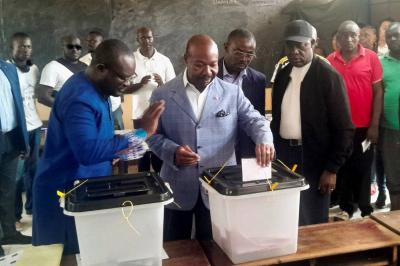Shortly after President Ali Bongo announced his victory for a third term in the presidential elections, securing 64.27% of the votes, a group of senior Gabonese military officers announced their takeover of power, claiming to represent all the country's defense and security forces. They attributed their actions to the lack of credibility in the recent general elections. The officers stated, "In the name of the Gabonese people, we have decided to defend peace by putting an end to the current system."
Later, military personnel announced on Gabon's national television that the military council appointed General Brice Oligui Ngouimba as the leader of the transitional phase. One of the officers read a joint statement while more than ten others stood silently behind him in military uniforms.
**Curfew Announced**
The coup leaders announced in a televised statement that "the nightly curfew imposed four days ago by ousted President Ali Bongo Ondimba will remain in effect until further notice to maintain calm."
**African Union Position**
The Chairperson of the African Union's Peace and Security Council, Willy Nyamitwe, stated that he held an emergency meeting with Burundi, Senegal, and Cameroon to analyze the situation in Gabon following the coup attempt. The Chairperson of the African Union Commission, Moussa Faki Mahamat, called on the Gabonese military today to ensure the safety of President Ali Bongo and his family after officers announced their takeover of power. He stated he was following the situation with great concern and condemned what he termed a coup attempt.
**Officers' Declaration**
The officers introduced themselves as members of the Committee for Transition and Restoration of Institutions. They announced the dissolution of several state institutions, including the government, Senate, National Assembly, Constitutional Court, and Election Center. Gunfire was heard in Gabon's capital, Libreville, in the early hours of Wednesday following the appearance of senior military officers on national television.
**President's Plea**
In his first appearance after the coup, detained President Ali Bongo appealed from his residence, urging the world and friends to act against those who arrested him, indicating that his son was detained somewhere and his wife was missing. This came in a video posted on the platform "X" (formerly Twitter) today, after military personnel had earlier announced the takeover on television. Bongo stated in the video, "I call on friends around the world to protest."
**White House Reaction**
John Kirby, spokesperson for the U.S. National Security Council, stated in a briefing that the United States is deeply concerned about the events in Gabon, where military officers announced their takeover today.
**United Nations Reaction**
United Nations Secretary-General Antonio Guterres condemned the ongoing coup attempt in Gabon, calling on all participants in the coup to "exercise restraint, engage in dialogue, and ensure respect for the rule of law and human rights," as well as "ensure the safety of the president and his family."
**Coup Trends in West Africa**
If this coup succeeds, it will be the eighth in West and Central Africa since 2020. Coups in Mali, Guinea, Burkina Faso, Chad, and Niger have hindered democratic progress in the region in recent years. Last month, the military seized power in Niger, causing shockwaves throughout the Sahel region and attracting global powers concerned about strategic interests at stake.
**Third Term Controversy**
The Gabonese Election Center indicated on Wednesday that President Ali Bongo won a third term in the presidential elections with 64.27% of the votes. This followed general elections that experienced delays, with the opposition claiming election fraud. Upon announcing the results early in the morning, the head of the election center, Michel Stéphane Bonda, stated that Albert Ondo Ossa, Bongo's main competitor, came in second with 30.77%. Bongo's team denied Ondo Ossa's allegations of electoral misconduct.
Tensions in Gabon are rising amid fears of disturbances following the presidential, parliamentary, and legislative elections held last Saturday. Bongo aimed to extend his family's 56-year dominance in power, while the opposition pushed for change in the oil-rich yet impoverished Central African state. Concerns regarding the transparency of the electoral process escalated in Gabon due to the absence of international observers, the internet service cut, and the implementation of curfews across the country after the elections.
On Monday, the organization Reporters Without Borders expressed concern over the internet service cuts in Gabon and the temporary suspension by authorities of broadcasts from international French stations. The organization stated online, "Reporters Without Borders condemns the severe attacks on press freedom and media pluralism, which are likely to negatively affect the transparency of the general elections."
The opposition protested Bongo's victories in previous presidential elections, citing fraud. In 2016, the parliament building was set ablaze during violent street protests against Bongo's re-election for a second term, a move that sparked controversy and conflict at the time, and the government then cut internet services for several days.
Gabon thwarted a military coup in January 2019 after soldiers briefly seized a radio station and broadcasted a message claiming that Bongo, who had suffered a stroke months earlier, was unfit for office. However, the situation was restored after hours, with two suspects in the coup being killed and others arrested.
Dollar-denominated bonds in Gabon declined by nearly four cents on Wednesday, and French mining company Eramet, which has extensive manganese production operations in Gabon, announced on Wednesday that it had suspended all its operations in the country.




